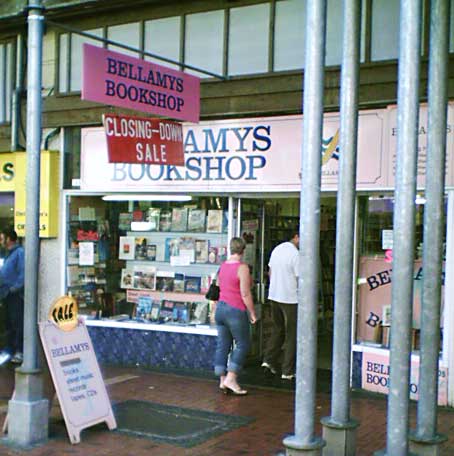Shopping and parking
My last "Shops that pass in the night" post mentioned the impending closure of Bellamys Bookshop in Cuba Mall. There's a short article about it on the very promising My Wellington site, which repeats the owner's claim that rising parking costs have driven away her customers. She is quoted as saying "Why would people come in when they can go to Tawa, Porirua and Lower Hutt for free?"
Now, perhaps my opinion of the suburbs is excessively jaundiced, and I need to make some fresh expeditions to see what their retail offerings are like these days, but I've never thought of Tawa, Porirua or Lower Hutt as the place to go for secondhand books on anthropology, mystic theology and Russian literature. If you want obscure and serendipitous, go to Cuba St. If you want wall-to-wall Dan Brown and free parking, then you go to the 'burbs. There are suburban secondhand bookshops, but from my (admittedly limited) experience, they tended to specialise in well-thumbed Mills & Boons and stacks of Mayfair from the 1980s.
If expensive parking was driving away potential customers, then one would expect a drop in overall pedestrian numbers in the CBD and an increase in the number of empty shops. On the contrary, pedestrian counts have significantly increased across the city in the last year, including in Cuba Mall, and retail vacancies are still very low. As Jan Gehl has pointed out (2.1MB PDF), Wellington has an extraordinarily high number of carparks for its size (five times the number in Copenhagen!), so there's no lack of parking available. On the other hand, the council has opened itself up to accusations of money grubbing by increasing charges rather than reducing the number of parks, and by neglecting to improve public transport to offer an alternative. If they doubled the frequency and halved the cost of the City Circular bus, for instance, they would have more cause to argue that they're motivated by urbanistic rather than financial considerations.

As much as I sympathise with Ms Lyudmild, and as much as I'll miss the presence of Bellamys in Cuba Mall, I don't think that parking charges are to blame. Nor is the number of bars in Cuba St, which is another factor that she cites (I can't quite follow her logic here). The owner of nearby Pegasus Books has a more plausible explanation: the rise of internet trading has hit the secondhand book trade as a whole. I'm probably one of a decreasing number of old fogeys who love to own and collect books, and relish random discoveries among the musty shelves of old books. Various commenters on my earlier post have other theories for the demise of Bellamys in particular, and they haven't even mentioned their egregious neglect of the apostrophe, which surely should bring about bad karma from the literary gods.



5 Comments:
I suggest that retirement is probably the real reason for the closure of what used to be my favourite book haunt - they had stopped buying in new books a long time ago. It is easy to have a swipe at an old bugbear (council's parking charges) in this situation. The comparison with Copenhagen is a little disingenous, as we are a vastly different culture (that is despite Statistics emphasis on 'European' ethnicity).
PS, get out to Archway Books in Pukerua Bay - heaps of gems there
The Copenhagen comparison is not so far-fetched: in the 60s they were being overwhelmed with cars like new world cities, but they deliberately reduced the amount of parking by 3% a year for 15 years. As a result, they were able to convert parking lots into squares and roads into pedestrian streets, and now have six times the amount of car-free public space that they had in the 60s!
You're right that culture is a challenge when it comes to turning around a city, but cultures can and do change. As Gehl says, many Danes originally objected to pedestrianised streets and plazas aimed for strolling and walking, because they thought it was not consistent with traditional Danish character that valued privacy and the home. The Danish were not Italians, they said, accustomed to dwelling in public places. "Now, we are more Italian than the Italians," he said. "We have developed a public-life culture that no one would have thought possible 40 years ago."
NZ's current car-dependent culture seems to me a result of two things: a "pioneer" culture, and the influence of American post-war attitudes. The former gives a belief in an unlimited frontier of land to be conquered and settled, as well as a myth of rural self-reliance rather than urban interdependence. The latter is based upon cheap oil and adds a fetishisation of the automobile as a symbol of liberation.
These myths are starting to crumble, I think. We may have a lot of land, but that's not the same as having a lot of land close enough to the city to commute cheaply. Our economy may still have a rural basis, but the vast majority of NZers live in towns and cities. Oil is no longer cheap, and the myth of free-wheeling "liberation" by cruising along the highway becomes pretty hollow when you spend most of your time in traffic jams.
So the culture might gradually change on its own, but it could benefit from a little prompting and the physical changes to the city that will help it happen. Wellington already has more in common with Copenhagen than we might think, especially compared to the rest of NZ. We've made a great start towards a lively street life, have a compact city centre, a relatively high use of public transport and an increasing number of inner-city residents. Physically, we have constraints that make uncontrolled sprawl relatively difficulat and expensive, and our outer suburbs mostly spread along linear corridors that are easier to serve by public transport. So I think we can go the rest of the way, given the political will.
And yes, Archway Books is quite nice. I stopped in there and browsed once at the end of a long walk, while I was waiting for the train back to Wellington. I've looked in a few secondhand bookshops in the Hutt, but none of them had the range or charm of Archway, let alone of the Wellington ones.
Finally, I wanted to finish the ethnicity discussion (for now), but I will just point out that the category was not "European" but "NZ European". It's like the difference between "African" and "African American": most African Americans haven't been to Africa, and know that they are not African, but they recognise that their ancestors came from there and they now have a distinctive culture that has evolved through its own history
The cultural differences are not just in car ownership, but also in political leaning. I suspect NZer's are more rightwing generally than the Scandinavians (just look at how 'centred' our LW govt is), and this has a huge impact on private vs public development. Also, in the eyes of the layperson (rather than trained or interested urban specialists) we have a lot less to protect in our urban centres than the Danes have in Copenhagen.
And one musn't forget that that the rejuvenated city centre of Copenhagen is just a pedestrian axis (very nice I agree), but the surrounding fabric has the same problems as any other city (despite a large, if bleak, transport hub at one end of this axis).
Perhaps the Copenhagen example is valid if its benefits inform the surrounding streets over time, but at the moment this is a hard case to put - it is rather a pretty tourist track that it is best not to depart from.
10 Haining Street is closing down.
Yes, I saw the posters. Not sure whether it was just too risky to open up so far from the beaten path, or whether there was some other reason for it shutting down. I seem to remember them saying that they only had temporary use of the space in any case.
Post a Comment
<< Home